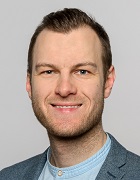
Prof. Dr. Stefan Weltge
Academic Career and Research Areas
Prof. Weltge (b. 1986) works on theoretical questions in discrete mathematics that concern the foundations of mathematical optimization. His research interests include combinatorial optimization, linear & integer programming, and polyhedral combinatorics.
Prof. Weltge studied Mathematics with a minor in Computer Science at the Otto von Guericke University Magdeburg and completed his studies there with distinction in 2012. After research visits in Tartu (Estonia) and Padua (Italy), he completed his Ph.D. in Magdeburg in 2016. He worked as a postdoctoral researcher at the Institute for Operations Research, ETH Zurich, from 2016 to 2018 and has been at TUM since 2018.
Awards
- Mathematical Programming Meritorious Service Award (2022)
- TUM Supervisory Award (2022)
- 3x Best Course awards, Mathematics, TUM (2019-22)
- Best Lecturer, Electrical and Computer Engineering, TUM (2019)
- Best Dissertation Award, University of Magdeburg (2016)
Key Publications (all publications)
A. Kupavskii, S. Weltge. “Binary scalar products”. Journal of Combinatorial Theory, Series B, Vol. 156, 2022, 18-30.
AbstractS. Fiorini, G. Joret, S. Weltge and Y. Yuditsky, "Integer programs with bounded subdeterminants and two nonzeros per row," 2021 IEEE 62nd Annual Symposium on Foundations of Computer Science (FOCS), Denver, CO, USA, 2022, pp. 13-24.
AbstractA. Cevallos, S. Weltge, R. Zenklusen. "Lifting Linear Extension Complexity Bounds to the Mixed-Integer Setting".Proceedings of the 2018 Annual ACM-SIAM Symposium on Discrete Algorithms (SODA). 2018, 788-807.
AbstractKaibel V, Weltge S: "A short proof that the extension complexity of the correlation polytope grows exponentially". Discrete & Computational Geometry. 2015; 53(2): 397-401.
AbstractIf you wish your profile to be changed or updated please contact Franz Langer.